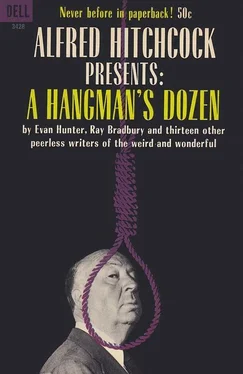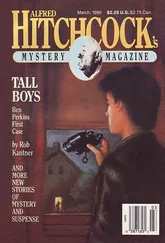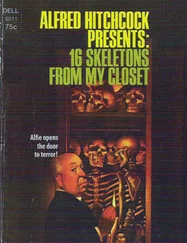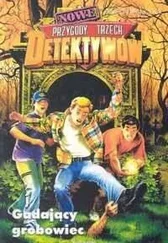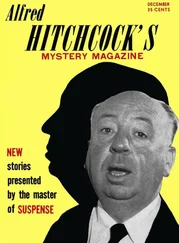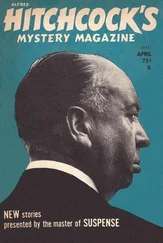“Oh, we were there,” Mr. Downey said. “Right on the dot, just like you said. But what took us a little longer, we were listening at the window and we had to come around to the door so you wouldn’t be between them and us.”
Jinny looked coldly at the three Farringtons, who were like grotesque shadows frozen in the act of trying to move.
“You killed Alice,” she said. “I knew all along you must have killed Alice. I loved her, but she was dull and plain and nobody would marry her, I knew, except for her money. So I promised myself I’d get you somehow. Since you’d killed her in a foreign country, the only way I could get you was by making you try to kill me — before witnesses.
“It was risky. Sure it was. But I studied psychology in college and Mr. Downey is a crackerjack private detective, and I thought I could do it, one way or another. I pretended to have dreams so you’d think I was a real nervous kid. Last night when you were willing to let me eat poisonous mushrooms, I knew I’d better do something. So I tried putting this hanging idea into your heads. I didn’t want you to try to drown me or push me off a cliff — I might not have been able to have stopped you if you’d done that. Well, it worked out as I hoped it would. You were so gullible, so easy to lead around. You should have seen your faces when I spilled that dish of mushrooms on the floor. Of course, the ones I’d eaten were the harmless ones.”
But she did not laugh at the memory. She only turned to Mr. Downey and Chief Lamb.
“Take them away, please,” she said.
The Farringtons went, followed by the two men with shotguns. Last of all came Jinny Wells. Behind her the noose, stirred by the air currents, twisted and curled.
As was mentioned earlier, the Farringtons were a rather attractive family, if you don’t mind overlooking a few bad habits.
But Jinny Wells was one individual who apparently did.
Let the Sucker Beware
Charles Einstein
I, if memory serves me right, have never purchased a bridge from anyone. But then I have never felt that possessing a bridge is essential to the good life. And now let me present Mr. Holland and his confrère Arch, who might conceivably try to sell you something of consequence, like the Mississippi River, its bridges and tributaries.
* * *
Well, we were riding this boat from Liverpool when Arch, my old buddy with whom I grew up together on the sidewalks of New York, brought up the matter of O. Henry.
“The trouble with you,” Arch said to me, “is you’re not up on your reading. You think all suckers have to come from some place else. Fifty years ago O. Henry knew better.”
“Quote me some O. Henry,” I said.
“Quote,” Arch said. “ ‘In the west a sucker is born every minute; but in New York they appear in chunks of roe. They lie down on the floor and scream and kick when you are the least bit slow about taking money from them.’ ”
“That was fifty years ago,” I said.
“Exactly,” Arch said. “People like you forget that the old ways were frequently the best ways. I think we should bear this in mind this trip. Instead of prowling the main salon for little old ladies from Nebraska and Toledo, I suggest we hunt up a live New Yorker.”
“New Yorkers are up on all the latest things,” I said. “I personally cannot imagine selling uranium stock to a fellow New Yorker, or offering our popular air-coach funeral service. Can you?”
“No,” Arch said, “but I think maybe we ought to try some of the older techniques. As I said to you only recently, the old ways are frequently the best ways. I got to thinking about this because of that uncle of yours who used to conduct that small but well-attended game of three-card monte on top of an unfolded newspaper on the subway platform at Seventh Avenue and Fourteenth Street.”
“You mean my uncle Herbert Holland,” I said. “I always thought his technique a little crude. He thought he could escape the police merely by switching from the uptown to the downtown sides of the subway.
“It was his name I was thinking about, not his technique,” Arch said. “For the remainder of this voyage, I suggest that you adopt your uncle’s name. You will be Mr. Holland. Tonight we are going to have a small game of cards with a gentleman I met on this boat. He is Worthington T. Jones, chairman of the board of several New York banks, and he seems friendly. The idea is to let Mr. Jones win some money at cards and remember at all tunes that your name is Holland. Leave the rest to me.”
Even after a lifetime in this particular trade, there are certain people whose money you dislike to take. Thus it was with Mr. Worthington T. Jones, who was a sociable, lonely old fellow with a crinkly face and a kind smile for all. He was so grateful to have somebody to play cards with that he nearly burst out crying.
“Money isn’t everything, boys,” he said, drawing one card to fill an inside straight. “Here I am worth several millions negotiable, and what good does it do?”
“Well,” Arch said to him, “don’t knock money. Ain’t that right, Mr. Holland?”
“That’s right,” I said.
“Mr. Holland here is a member of the Holland Tunnel Hollands,” Arch said. “A fine old New York family. In June 1958, when the 30-year public bonded indebtedness is paid off, Mr. Holland here will become owner of the tunnel outright.”
“You don’t say?” Mr. Jones said to me.
“Yes,” I said. “I can hardly wait.”
“Permit me,” Mr. Jones said to me, “as a banker with considerable experience, to offer you a suggestion. You should set up a corporation and peddle stock. Consider the tax benefits.”
“This,” Arch said to Mr. Jones, “is precisely what Mr. Holland has in mind. However, there are other members of the Holland family to consider.”
“Well,” Mr. Jones said, and exhibited fives full over treys, “of course if he has relatives to consider...”
“However,” Arch said hastily, “the decision is his to make. Right, Mr. Holland?”
“Right,” I said. “I can hardly wait till June 1958. There is a lot of revenue from a thing like a tunnel.”
“If Mr. Holland could make a quick sale,” Arch said to Mr. Jones, “I would be willing to bet he would do it. Of course, it would have to be done quietly so as not to alert the rest of the family.”
“You don’t say?” Mr. Jones said. “How many vehicles a year use the tunnel, might I inquire?”
“Including westbound and eastbound tubes, some 60 million,” Arch said. “After salaries and upkeep that is quite a bit left over.”
“You’d be asking quite a fancy figure if you were to sell,” Mr. Jones said to me. “Or so I’d imagine. Did you have a price in mind?”
“It would be a distress sale,” Arch said hastily. “Remember, the tunnel doesn’t start paying off until June 1958, and Mr. Holland here can use a little ready scratch.”
“Well, boys, it’s my bedtime,” Mr. Jones said, and reached for his winnings. “It certainly has been fascinating talking to you two boys.” And he smiled and nodded and got up and went his way.
“Saints-at-large,” I said to Arch, “are you really going to sell him the Holland Tunnel?”
“He’s panting for it,” Arch said. “Does a hundred thousand sound like a fair score?”
“You were right about that part where I could use the money,” I said. “Meanwhile, what is the next step?”
“One or two more losing evenings at cards should do it,” Arch said. “And in between times I shall visit the ship’s printing office and have the necessary documents brought into being.”
We met Mr. Tones for a few hands again the following evening. The conversation concerned everything except the Holland Tunnel, and I wondered how Arch was going to bring the subject up. But he was just biding his time. The opening came when the waiter brought a round of drinks. Arch left a bountiful tip on the tray.
Читать дальше
